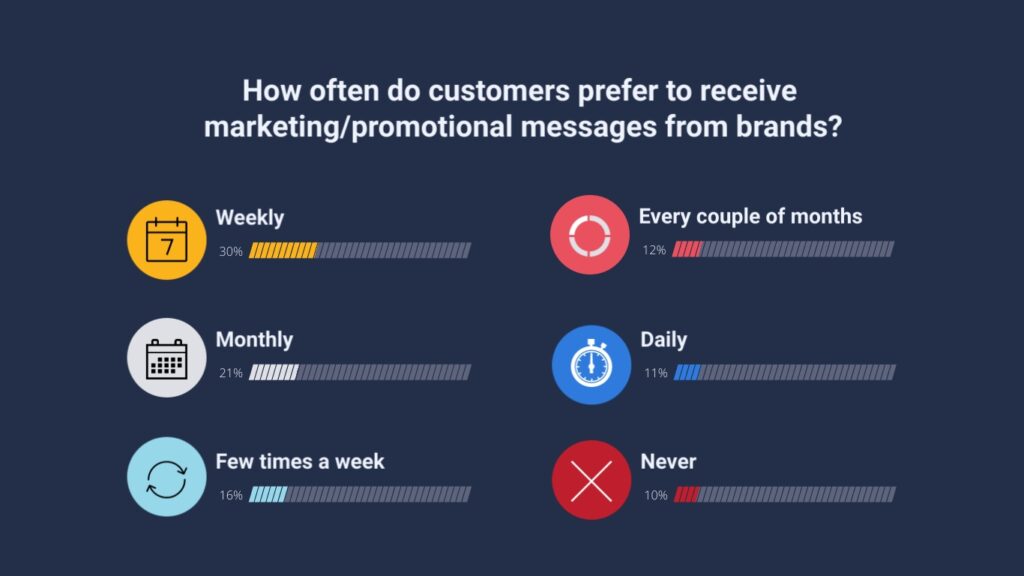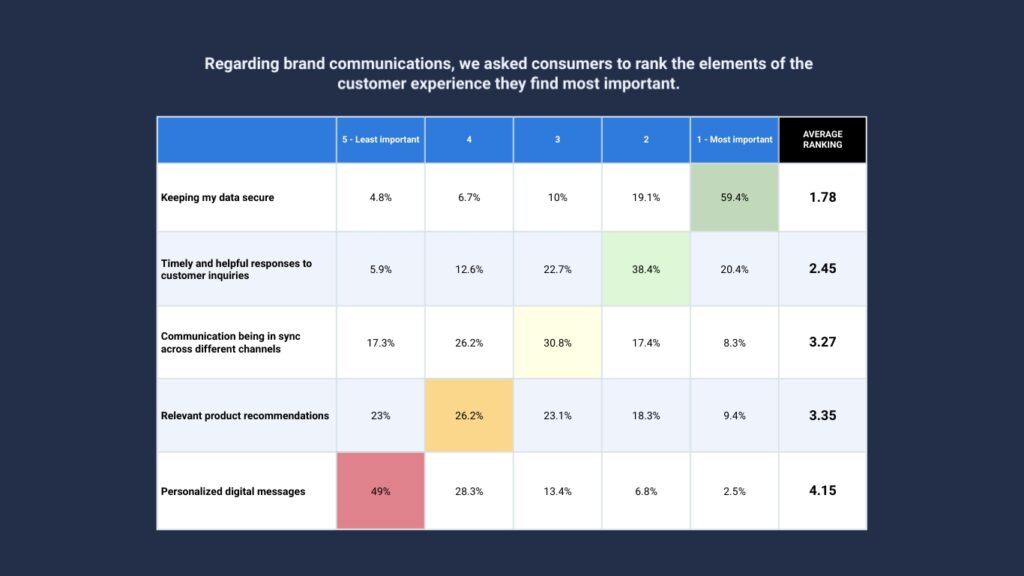What do consumers want? The answer can be summed up with two simple words: “it depends.”
Clear as mud? Yeah, we know. But we’re here to help sort it out.
We wanted to better understand consumer expectations of today’s big brands so we surveyed more than 1,000 consumers. To help break down the results of that survey, Will Devlin, VP Marketing at MessageGears, walked through the findings with Ryan Serpan, VP Strategy and Insights at Blend360, and Natalia Dykyj, CMO at MessageGears.
In this blog we’ll go through some of the panel’s insights about what these results mean for today’s big brands, and help you better understand the behavior and preferences of online shoppers.
First a little background: The survey was a study of consumer expectations aimed at understanding the actions and desires of online shoppers. At the end of 2022, MessageGears targeted 1,000+ individuals who reported making an online purchase at least once per month on average.
Takeaway 1: Mix it up
Where do consumers place the most online orders? When they’re shopping online, the survey showed they’re mostly using mobile devices. Only 32% of the respondents said that they shopped mostly on PC or desktop.
In the meantime, when asked which channel consumers prefer when it comes to promotional messages from brands, most people want to receive them through email rather than SMS, in-app messages, or push notifications.
Ryan’s perspective:
“I think the key word in that sentence is promotional messages. And if you think about how SMS hits you, there’s kind of a privacy component of that, right? That’s the safe space where you’re having conversations with your friends and you’ve got group chat threads and you’re sending pictures of your kids to your mom – and then all of a sudden I’m trying to offer you 25% off on these really cool pairs of pants. That may be the wrong time and place for it. Where we do see SMS as an awesome vehicle for transactions like, “Hey, I ordered something. I want to know when it’s arriving.”
Natalia’s perspective:
“To hit somebody in the right moment and disrupt their day with an SMS or a mobile push is a much more disruptive experience. That’s why brands need to be really artful and really timely and contextually relevant when they do send that message. It can be really powerful if you get it at the right time. But if you’re disrupting their everyday flow, it’s a very different equation.”
“Brands need to be really artful and really timely and contextually relevant when they do send that message.”
Takeaway 2: Watch your timing
In our survey on consumer expectations, we wanted to know how often customers prefer to receive messages from brands. Most people said weekly (30%), followed by monthly (21%) and then a few times a week (16%).
Next we asked how many customers say they will unsubscribe from brands that send too many messages or too many irrelevant messages, and not surprisingly, most strongly agreed that they would unsubscribe.

Natalia’s perspective:
“The same way we would personalize an email to somebody’s preferences, shouldn’t we be determining frequency based on people’s preferences? So not only should every brand be determining what’s right for their overall customer, but also for individual people, for individual cohorts, individual preferences, all of that. There’s no one size fits all solution for any of the things that we do as marketers. I think the more that we can understand our audiences and the things that matter to them and the ways they like to communicate with us, that’s what you should go with.”
Ryan’s perspective:
“This is one of the areas where data can really help us analyze that story, right? Because some people will open the email every time, you know. I love the brand, I shop there all the time, and I’m okay if you send me an email every day. It’s not going to annoy me because, you know, I’m really into that brand. Whereas others might be like I’ve just created this relationship with you. I bought one thing from you and now you’ve hit me with 19 emails in the next 48 hours. That could create a bad experience. And I think we can analyze that. We can collect data signals and we can look back at the cohort and say, who are they? And is there a model that tells me what the behavior will be?”
Takeaway 3: Put the focus on your customers
Only 11% of consumers say that the large brands they interact with exceed their expectations all the time.
We also asked consumers to rank the elements of the consumer experience that they found most important. The number one thing that customers said they want is data security from the brands they communicate with.

Ryan’s perspective:
“How many of you have a KPI in your matrix that is personalization and customer delight? …If you don’t have that KPI and you’re not measuring it, of course you’re not hitting it. There’s a reason why so many companies don’t hit that metric. Let’s be real, direct response messaging sometimes isn’t the most surprising delight messaging, but it is the most converting. So we’re going to default to conversion-heavy messages, not necessarily experience-heavy messages, right?”
Natalia’s perspective:
“It’s not just always about the pitch and about getting the dollars from me. Be helpful to me in the moment that I need it. And that helps me build affinity with your brand, helps me build trust, all the things that’ll ultimately lead to a purchase decision. I have found that those are the moments that were delightful to me. It’s not that they were trying to hit me over the head with a 20% off coupon. I can get that anytime, right? If you’re really being helpful to me in a way that I don’t feel like you’re trying to sell something, that, to me, is delightful.”
Takeaway 4: Make it relevant
Half of respondents in our survey on consumer expectations said that they are annoyed when brands send generic messages, and over 75% said they will unsubscribe from brands that send too many irrelevant messages. Two-thirds of respondents said brands that create a personalized customer experience are more likely to get their business.
On the other hand, 87% feel that less than half of the brand marketing messages they get are personalized.
Natalia’s perspective:
“I think the bottom line is – regardless of what may be more important to them from a safety and security and whatever other standpoint – if you want your messages to convert, you need to be more personalized and relevant and timely, and get them the right offers and messages and help at the right time.”
Ryan’s perspective:
“I think the challenge here is how do you create personalization and relevancy? I’ve seen a lot of times with some of our clients that, yeah, we’re going to personalize. And they set up the triggers, and they’ve got all the automations. They’ve got all the MarTech to do it… And then it’s basically the same offer with just a different color and a different button. That’s not personalization. Nobody knows that you changed the color for them. Nobody knows that you move the button for them. Those are optimizations. And so I think strategically one of the ways that we talk about it is audience strategy versus product strategy.”
Takeaway 5: Play the long game
Consumers shared that they’re willing to provide more of their data to brands if they trust them. As we mentioned earlier, the number one thing that customers said they want is data security from the brands they communicate with.
So how do you build that trust so that your consumers are willing to give you more information?
Ryan’s perspective:
“Your brand has to have an ethos that matters. You’ve got to actually have a story that’s relevant to your brand. You’re advertising to a consumer that believes in what you believe in, theoretically. And of course it’s not every cohort in your audience, but if you have that ethos and you have that truth, it’s easier to then create relevancy from your brand to the consumer.
But it’s a long game. It’s not a short game. And that’s hard, right? Because sometimes we’re all measured on what’s going to happen next month. What did you do for me lately? But truthfully, I think the brands that I see doing this right are the ones that play the long game and stick to their ethos instead of, you know, letting urgent needs get in the way of what their brand is really meant to stand for.”
Natalia’s perspective:
“It’s also, ‘how secure do I feel with you?’ How much do I trust you for help? How much are you hitting me on the head with offers versus just being helpful and relevant and timely with me? I think it’s that holistic brand experience that you’re creating, not just trying to sell me another product. If you play that long game, that’s going to pay off in dividends in the long run.”
“I think the brands that I see doing this right are the ones that play the long game and stick to their ethos”
Consumer expectations are unique to your brand
While there are certainly best practices and industry benchmarks you can compare your brand to, so much of the success of your customer communications come down to your specific audience.
The most successful brands get to know their customers and then provide an experience that those customers want to engage with.
Want to check out all of Natalia, Ryan and Will’s conversations around our survey on consumer expectations? You can watch the full video anytime!





